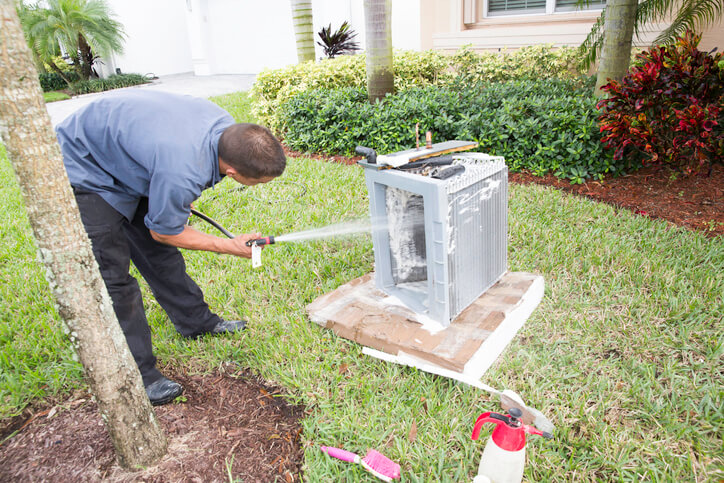
How To Determine If There Is Mold In Your AC Unit
Having mold within your AC unit is a concern not only for those who ingest the mold spores through the air but also for the HVAC unit itself as mold may damage the system. If you suspect mold growth within the HVAC, there are steps you can take to confirm the mold’s musty presence, prevent future mold growth, and restore the air quality in your home and business. Our AC company in Gainesville, FL is here to explain everything you need to know about mold growth in your air conditioner unit.
What Causes Mold To Grow In The AC?
Mold requires ample moisture for spores to grow and flourish. Unfortunately, AC units can be the ideal environment for mold growth — and mold can spread quickly as it feeds off of moisture and dust present within the unit. AC units that are turned off entirely or lack a humidity control feature will begin to dampen, and eventually the system’s inner workings will reach ideal moisture levels for mold growth. Additionally, systems that are not maintained or cleaned on a regular basis are at risk as air filters can also be common mold breeding grounds.
How To Identify Mold Growth
A few areas are prime spots for mold to grow within plain view, such as on or around the air vents, air filters, and walls of the structure. Our HVAC experts suggest taking the following steps to investigate the presence of mold:
- Analyze the walls, air vents and air filters for visible mold activity
- Inspect the HVAC system, including drain pain, insulation liner and evaporator coil
- Take note of the mold’s appearance, including color and appearance
- Take note of the structure’s smell — mold smells musty and earthy
- Pay special attention to areas where a leak is present, such as windows or plumbing
- Check belongings in the home — books, clothing, etc.
Individuals who regularly breathe the air that is circulated by the mold-riddled unit may have symptoms from ingesting the mold. The effects of breathing in the mold spores are wide-ranging as the severity and type of mold can cause various symptoms and health conditions. Additionally, the length of time in which the individual(s) were exposed to the mold will further determine the experienced symptoms. All or some of the following symptoms may be experienced by any individual who has been exposed to the mold:
- Itchy, irritated eyes, nose and throat
- Fatigue
- Breathing difficulties
- Nausea
- Vomiting
- Chronic coughing, wheezing and sneezing
- Diarrhea
- Skin irritation or rash
- Inability to focus
- Nosebleeds
Whether you have suspected or identified the presence of any amount of mold in your home or business, schedule HVAC service immediately. Remember, areas need to be treated to properly remove mold, as it cannot be wiped away as easily as dust or pollen. It’s necessary to address the source of the mold and repair the issue(s) that are allowing the mold to grow, as well as adequately clean the structure and purify the air.
How To Prevent A Mold Re-Growth
Whether your HVAC system required AC repairs or your home required an AC installation, it’s important to be proactive in preventing any subsequent mold outbreaks. LIBERTYAIR recommends the following steps to prevent future mold growth and maintain indoor air quality:
- Change air filters monthly
- Repair any leaks in ductwork or around windows and doors
- Install an air purifier
- Schedule HVAC maintenance
Rely on LIBERTYAIR for thorough, planned HVAC system maintenance. Our team is dedicated to quality service and customer satisfaction so you can breath mold-free, healthy air.